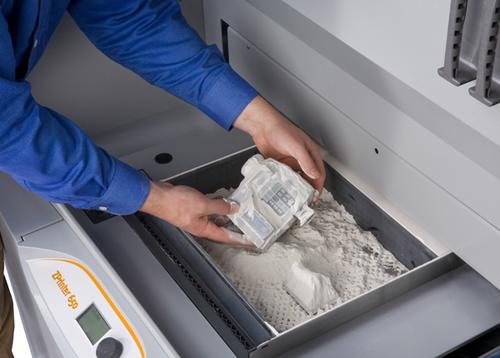
3D-printed copy of a dinosaur fossil next to the original, still in its plaster jacket
Posted on 11/26/2013 10:05:02 AM PST by null and void
Researchers discover a way to turn 2D scans into 3D bones
It’s almost impossible to hate dinosaurs, and with all of the advances that have been recently made because of it, it’s equally impossible to hate 3D printing. Now, researchers from Germany have discovered a way to combine these two amazing things, forming a process that allows them to recreate 3D models of dinosaur fossils.
Because fossils are, by nature, fragile things, their study requires them to be carefully protected from damage, most often by encasing them in plaster “jackets.” However, in order to actually study the fossil—as well as the materials and sediments surrounding it—paleontologists have to remove the plaster, which more often than not leads to losses of valuable material and sometimes even the fossil itself. It’s a Catch-22 that 3D printing has finally been able to solve.
Alongside colleagues, study author Ahi Sema Issever, an M.D. from the Department of Radiology at Charite Campus Mitte in Berlin, has developed a method of using computed tomography scans and three-dimensional printers in order to make accurate copies of fossils bones. Their methods allow them to separate fossilized bone from its surrounding sediment and produce a 3D copy, with absolutely no destruction of the sample necessary.
Issever’s team tested their method on one of the scores of unidentified fossils at the Museum fur Naturkunde, one of the major natural history museums in Berlin. Their sample fossil was part of a collection of unsorted fossils that had been buried under rubble in the museum’s basement after a bombing during World War II.

3D-printed copy of a dinosaur fossil next to the original, still in its plaster jacket
The team performed a computed tomography scan, which uses radiation, with a 320-slice multi-detector system. By measuring the different radiation absorption rates of the fossil, which differed from its surrounding plaster jacket, they were able to clearly depict the fossil itself.
After comparing the CT scan to the old excavation drawings, the team was able to both identify the artifact — it turns out it was a fossil from the Halberstadt excavation, a major dig between 1910 and 1927 — as well as show the condition of the fossil without cracking open the cast itself. Their scan showed multiple fractures and damage to the front rim of its vertebral body, both things that would have surely destroyed the fossil had the museum attempted to remove it from its casing.
Using the data from the CT scan, the team was then able to help the researchers build a reconstruction of the fossil with selective laser sintering, a technique that fuses materials together to form a 3D object using a high-powered laser.
According to Issever, the fact that this method was discovered just as 3D printing is becoming more and more common and more and more and more advanced is wonderful. Not only will it aid in the preservation and study of fossils, but the new technological advances of 3D printing mean the research and reproductions can be easily shared among fellow academics and the public.
For more information on CT scanning and this process, visit RadiologyInfo.og!

Political power grows out of the nozzle of a 3-D Printer.


Who dug-up a long dead Grandpa Munster for that photo?
He ain’t dead.................
I can see all kinds of areas for that - Sumerian cuneiform tablets for one. Ought to help by passing 'em around to aid/confirm translation.
lol
those dino’s were just napping for eons
Vampires never die...............nor do other blood-suckers................
Don't paleontologists typically dig up large blocks of stone containing the fossils and then wrap that block of stone with the plaster bandages for transport back to a lab? Removing the plaster shouldn't be a big deal, but a couple of hundred pounds of rock surrounding the fossil could be.
That picture keeps getting posted here. what is that supposed to be a print out of?
It is a prototype camcorder.
On a hike in the mountains recently, we came across a rather nice fossil of a dinosaur leg. It was a foot about 20” from toe to ankle, with two distinct ball and socket ankle and elbow joints, and some significant amount of bone still present. 3D technology would have some huge advantages in rendering these to workable models.
Those Sumerian cuneiform tablets were found all over the Middle East for centuries, along roads, in ruins, in excavations of all sorts of places. They were common as dirt.
But nobody knew what they were, or what they had written on them until they were able to translate them in the 1800’s.
Then it was all too clear: THEY WERE TAX RECORDS....................
The IRS was hacked a long time ago.

Did you take picture?
I’d like to see a 3-D image of those saddles they wore! (Ducking for cover)
I believe this did this, fictionally of course, in Jurassic Park III.
We did take a picture.
Disclaimer: Opinions posted on Free Republic are those of the individual posters and do not necessarily represent the opinion of Free Republic or its management. All materials posted herein are protected by copyright law and the exemption for fair use of copyrighted works.